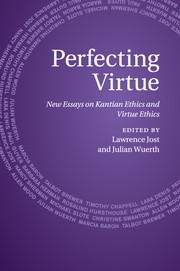Book contents
- Frontmatter
- Contents
- Notes on contributors
- Acknowledgements
- List of abbreviations
- Introduction
- 1 Virtue ethics in relation to Kantian ethics: an opinionated overview and commentary
- 2 What does the Aristotelian phronimos know?
- 3 Kant and agent-oriented ethics
- 4 The difference that ends make
- 5 Two pictures of practical thinking
- 6 Moving beyond Kant's account of agency in the Grounding
- 7 A Kantian conception of human flourishing
- 8 Kantian perfectionism
- 9 Aristotle, the Stoics, and Kant on anger
- 10 Kant's impartial virtues of love
- 11 The problem we all have with deontology
- 12 Intuition, system, and the “paradox” of deontology
- Bibliography
- Index
Introduction
Published online by Cambridge University Press: 04 February 2011
- Frontmatter
- Contents
- Notes on contributors
- Acknowledgements
- List of abbreviations
- Introduction
- 1 Virtue ethics in relation to Kantian ethics: an opinionated overview and commentary
- 2 What does the Aristotelian phronimos know?
- 3 Kant and agent-oriented ethics
- 4 The difference that ends make
- 5 Two pictures of practical thinking
- 6 Moving beyond Kant's account of agency in the Grounding
- 7 A Kantian conception of human flourishing
- 8 Kantian perfectionism
- 9 Aristotle, the Stoics, and Kant on anger
- 10 Kant's impartial virtues of love
- 11 The problem we all have with deontology
- 12 Intuition, system, and the “paradox” of deontology
- Bibliography
- Index
Summary
The origin of the contemporary debate between Kantian ethics and virtue ethics can be traced back to G.E.M. Anscombe's 1958 essay, “Modern Moral Philosophy,” which revived interest in virtue ethics in contemporary philosophy and challenged the way modern moral philosophy, including Kantian philosophy, was done, especially in contrast with Aristotle's classical version. But it was only later, in the late 1970s and early 1980s, that discussion between virtue ethicists and Kantian ethicists really picked up.
The Kantian ethics with which virtue ethics then clashed was one that had been defined and defended largely in contrast with utilitarianism. Where utilitarianism had struggled to provide an adequate account of individual rights, Kantian ethics provided a staunch defense. Kantians, most influential among them John Rawls, rested this defense largely on the lessons of Kant's Grounding of the Metaphysics of Morals.
As the title of the Grounding makes clear, Kant intended for this work to provide the foundation for a “metaphysics of morals,” i.e. the foundation for an ethics grounded a priori, in pure reason, not a posteriori, in experience. And Kant believed that he accomplished this by clarifying the nature of the moral law, or the “categorical imperative.” But all too often, Kant's defenders and detractors alike took this foundation for Kant's ethics as a whole, focusing their attention narrowly on the categorical imperative, even more narrowly on one particular version of this law, the “formula of universal law,” and on Kant's views on how we should apply this version of the law to our subjective principles of action, or “maxims.”
- Type
- Chapter
- Information
- Perfecting VirtueNew Essays on Kantian Ethics and Virtue Ethics, pp. 1 - 7Publisher: Cambridge University PressPrint publication year: 2011

